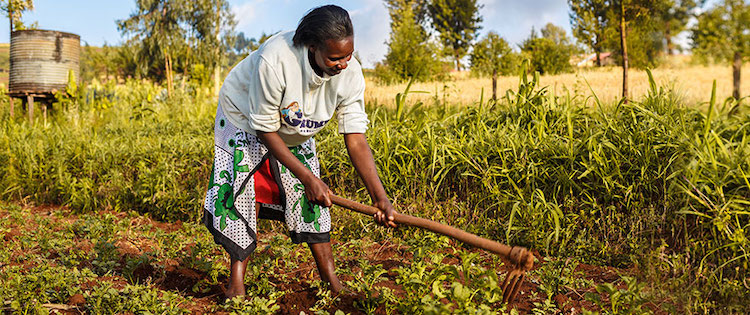By Jeffrey Moyo
MUREHWA, Zimbabwe (IDN) – Year after year since 2015, 56-year old Hapias Zindove has delivered hundreds of tonnes of soya beans to Zimbabwe’s Grain Marketing Board (GMB). With proceeds from soya beans, he – the father of seven children – has managed to send four of them to universities.
“I have risen from being a mere hands-to-mouth farmer to a big supplier of soya beans even to the GMB and big supermarkets in the country,” Zindove tells IDN in a ‘rugs-to-riches story’, as he rides on success in his farming endeavors.
As development expert Learnmore Machuve points out, from East Africa to West and Southern Africa, the European Union (EU) is backing various initiatives in sustainable agriculture, all aimed at placing the African, Caribbean, and Pacific (ACP) Group of States in a position to wield the potential to rise from agricultural backwardness to becoming potential bread baskets for the African continent.
The EU, FAO – the Food and Agriculture Organization of the United Nations – and the Government of Zimbabwe launched a major programme to assist smallholder farmers boost productivity and engage in commercial agriculture through integrated farming approaches.
The four-year US$19 million programme is managed by FAO and focuses on smallholder irrigation and livestock production support activities. As part of the larger programme, the livestock component (about US$ 10 million) is placing special emphasis on supporting 40 000 poor farmers – in Nkayi and Lupane Districts in Matabeleland North Province – who practice mixed crop-livestock production.
Building on lessons learned from previous projects, the current programme is improving livestock policies, animal health systems and strengthening the whole livestock value chain, says FAO. “This is leading to a more predictable and sustained income of smallholder farmers as well as improving general nutrition of farmers by ensuring access to animal products.”
FAO’s Subregional Coordinator for Southern Africa and country representative in Zimbabwe, David Phiri, said, “This partnership between the Government of Zimbabwe, the EU and FAO is a reaffirmation of the commitment and dedication of all the three players in ensuring a food-secure Zimbabwe. Globally, the EU is FAO’s largest resource partner, and in Zimbabwe we have already partnered on a number of projects.”
In April 2018, just North of Zimbabwe, the EU and Zambia signed an 87 million Euro Programme to develop sustainable agriculture in that country. During the signing in ceremony of the fund to Zambia, Alessandro Mariani, the country’s EU ambassador, said, “this programme (funded through the European Development Fund) will go well beyond securing subsistence of the rural poor. It will contribute to make agriculture a profitable business for entrepreneurial smallholder”.
In March 2019, the EU signed financing agreements with the Government of Mozambique in Maputo. Together worth € 217 million, the agreements are in part aimed at supporting areas like sustainable agriculture and agribusiness as well as for road rehabilitation in rural areas and trade facilitation and sustainable natural resources management.
In July 2019, the EU made a new financing to the tune of 34 billion Uganda shillings available to support agribusiness in Uganda. According to the EU, the agribusiness impact fund, set up in January 2017 by the EU, among others through the International Fund for Agricultural Development (IFAD).
Giving life to Uganda’s agricultural sector has been at the forefront for the EU. “Mobilizing investments for the agro industrialization of Uganda has been the main reason for the creation of Yield Uganda Investment Fund by the EU,” said EU Ambassador to Uganda, Attilio Pacifici.
Further up in East Africa, in Kenya, in June 2019, the EU made € 50 million to help finance smallholder agribusinesses, this by funding a facility known as Kenya Agriculture Value Chain Facility.
Catherine Collin, the European Investment Bank regional representative for East Africa, said the programme will involve local lender Equity Bank to implement the Kenya Agriculture Value Chain Facility to help firms in agriculture expand their business while adopting latest technology.
Equity Bank Kenya Managing Director Polycarp Igathe said the lender is aligning its strategy with the national agenda and will be focusing on growing the agribusiness from retail, to large enterprises. As part of the national agenda, the government recently identified food security.
“Under the new financing programme agricultural companies across Kenya will be able to access loans with maturities of up to 7 years, longer than commonly available in the market,” he said in a statement.
“This move is expected to help companies to expand, upgrade and modernise their equipment thereby improving productivity, and strengthening integration of smallholders into the agricultural value chain.” The money will be provided in Kenya shillings in what officials said will shield local investors from forex fluctuations. [IDN-InDepthNews – 19 October 2019]
Photo: 70 percent of the population in Africa are smallholder farmers. Credit: Crop Science Bayer.
IDN is flagship agency of the International Press Syndicate.
facebook.com/IDN.GoingDeeper – twitter.com/InDepthNews

